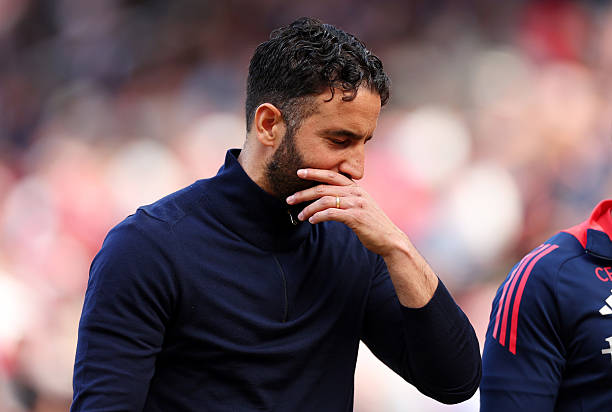Ruben Amorim’s tenure at Manchester United has veered dangerously off course. Appointed in November 2024 to steady a faltering ship, the Portuguese manager finds himself under intense scrutiny after a dismal run of form that has plunged the Red Devils into 16th place in the Premier League—just two points above the relegation zone.
The recent 2-0 home defeat to West Ham extended United’s winless streak to seven matches, equalling their worst such run in Premier League history. In Amorim’s own words, it’s “embarrassing.”
When Amorim replaced Erik ten Hag mid-season, expectations were cautiously optimistic. United were underperforming but sat in 14th, with a belief that a new voice could galvanize the squad. Instead, the downward spiral accelerated. In 25 league matches under Amorim, United have secured just 24 points, with a paltry 24% win rate—the worst of any United manager since the Sir Alex Ferguson era.
Statistically, the story is grim. United have only beaten relegated sides Ipswich and Leicester since late January. If results against the bottom three teams were excluded, they would sit dead last. With two games remaining, even victories against Chelsea and Aston Villa wouldn’t lift them above 13th, which would mark their lowest-ever Premier League finish—five places worse than last season’s eighth.
Their home form has been catastrophic. Nine league defeats at Old Trafford equals the club’s record for most home losses in a season—matching failures from as far back as 1930-31 and 1962-63. Falling behind in 19 of 25 games, including 12 times at home, United have struggled to recover, registering only three comeback wins.
Their attacking woes mirror their defensive fragility. United have failed to score in 10 of Amorim’s 25 league games, with just 30 goals from 344 shots. Only Leicester and Southampton have a worse conversion rate. Meanwhile, the defence has leaked 41 goals, with just four clean sheets to show for it.
Amorim’s side has also underperformed relative to expected goals (xG), with only Crystal Palace faring worse in that metric. Despite having attacking talents like Marcus Rashford, Rasmus Højlund, and Bruno Fernandes, United look blunt in front of goal and vulnerable at the back.
Even more damning is the comparative table since Amorim’s first match on 23 November: United rank 16th, behind teams like Nottingham Forest, Crystal Palace, and Brentford. Once-mighty United now find themselves among clubs desperately battling for Premier League survival.
The only bright spot for Amorim has been Europe. United remain unbeaten in the Europa League and have reached the final, where they’ll face Tottenham on 21 May. Victory would not only deliver a rare piece of silverware but also offer a backdoor entry into next season’s Champions League.
But even Amorim admits there’s a dilemma. “I don’t know what is best, if it’s playing in the Champions League or not,” he said, hinting at fears over whether his struggling squad could cope with elite continental competition.
Critics have argued that United’s domestic collapse stems from putting all their eggs in the Europa League basket. In their past seven league matches, they’ve picked up just two points—a tally that would leave them in the relegation zone if the season had started then.
With his future in doubt, Amorim conceded he might walk if results don’t improve. “I may have to leave,” he recently admitted, a sentiment echoed by fans and pundits who have grown frustrated with the team’s lack of identity and fight.
A Europa League trophy might buy him time. But unless there’s a dramatic turnaround, Ruben Amorim’s stint at Manchester United may be remembered more for setting unwanted records than restoring the club’s stature.



